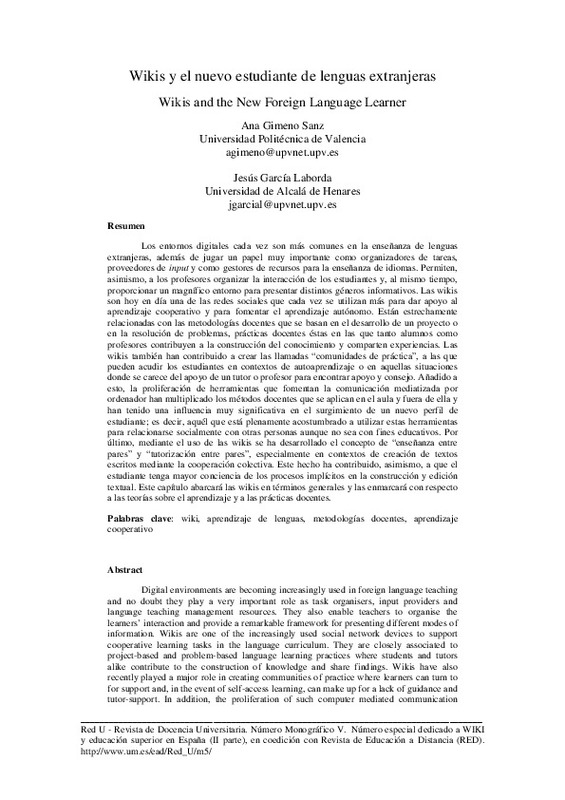Balkcom, S. (1992) Cooperative Learning. Education Research Consumer Guide. Office of Educational Research and Improvement. U.S. Dept. of Education. Office of Research. Disponible el 12 de noviembre de 2009 en http://www.ed.gov/pubs/OR/ConsumerGuides/cooplear.html
Boule, M. (2008) Go with the flow: Selling social networking. School Library Journal, 54(11), 50-52.
Davidson, M. (2008) Using focus groups to learn about my wiki. Computers in Libraries, 28(1), 16-19, 47-48.
[+]
Balkcom, S. (1992) Cooperative Learning. Education Research Consumer Guide. Office of Educational Research and Improvement. U.S. Dept. of Education. Office of Research. Disponible el 12 de noviembre de 2009 en http://www.ed.gov/pubs/OR/ConsumerGuides/cooplear.html
Boule, M. (2008) Go with the flow: Selling social networking. School Library Journal, 54(11), 50-52.
Davidson, M. (2008) Using focus groups to learn about my wiki. Computers in Libraries, 28(1), 16-19, 47-48.
Engstrom, M. E., & Jewett, D. (2005) Collaborative learning the wiki way. TechTrends: Linking Research & Practice to Improve Learning, 49(6), 12-16. Disponible el 23 de agosto de 2009 en http://www.aect.org/Intranet/Publications/techtrends/4906.asp.
Forte, A. y Bruckman, A. (2006) From Wikipedia to the Classroom: Exploring Online Publication and Learning. Proceedings of the 7th international conference on Learning Sciences. Georgia: International Society of the Learning Sciences, pp 182 - 188. Disponible el 26 de agosto de 2009 en http://www.cc.gatech.edu/~asb/papers/forte-bruckman-icls06.pdf
Forte, A. y Bruckman, A. (2007) Constructing Text: Wiki as a Toolkit for (Collaborative?) Learning. Proceedings of the 2007 international symposium on Wikis. New York: ACM publications, pp. 31 - 42. https://doi.org/10.1145/1296951.1296955
Foster, A. L. (2008) Providing online textbooks to the developing world. Education Digest: Essential Readings Condensed for Quick Review, 73(7), 14-16.
Galloway, C. M. (2001) Social Constructivism. En M. Orey (Ed.), Emerging perspectives on learning, teaching, and technology. Disponible el 8 de noviembre de 2009 en http://projects.coe.uga.edu/epltt/.
García Laborda, J. (2009) Using webquests for oral communication in English as a foreign language for Tourism studies. Educational technology and Society, 12(1), 258-270.
Gerlach, J. M. (1994) Is this collaboration? En Bosworth, K. y Hamilton, S. J. (Eds.), Collaborative Learning: Underlying Processes and Effective Techniques. New Directions for Teaching and Learning Nº 59. https://doi.org/10.1002/tl.37219945903
Gudea, S. (2008) Expectations and demands in online teaching: Practical experiences. Hershey, PA: Information Science Publishing/IGI Global. https://doi.org/10.4018/978-1-59904-747-8
Hanaoka, O. (2007) Output, noticing, and learning: An investigation into the role of spontaneous attention to form in a four-stage writing task. Language Teaching Research, 11(4), 459-479. https://doi.org/10.1177/1362168807080963
Holec, H. (1997) Autonomie et apprentissage des langues étrangères. Autonomie & enseignement. Apprentissage des langues étrangères. Ed. Bernard André. Paris: Didier.
Jones, D. (1996) What is Problem-Based Learning? Disponible el 10 de junio de 2009 en http://edweb.sdsu.edu/clrit/learningresource/PBL/WhatisPBL.html.
Kessler, G. (2009). Student-initiated attention to form in wiki-based collaborative writing. Language Learning & Technology, 13(1), 79-95.
Kim, B. (2001) Social Constructivism. En M. Orey (Ed.), Emerging perspectives on learning, teaching, and technology. Disponible el 8 de noviembre de 2009 en http://projects.coe.uga.edu/epltt/.
Lund, A. (2008a) Wikis: A collective approach to language production. ReCALL, 20(1), 35-54.
https://doi.org/10.1017/S0958344008000414
Lund, A. (2008b). Assessment made visible: Individual and collective practices. Mind, Culture, and Activity, 15(1), 32-51.
Mak, B., & Coniam, D. (2008) Using wikis to enhance and develop writing skills among secondary school students in Hong Kong. System: An International Journal of Educational Technology and Applied Linguistics, 36(3), 437-455. https://doi.org/10.1016/j.system.2008.02.004
Morgan, B., & Smith, R. D. (2008) A wiki for classroom writing. Reading Teacher, 62(1), 80-82. https://doi.org/10.1598/RT.62.1.10
Oreg, S. y Nov, O. (2008) Exploring motivations for contributing to open source initiatives: The roles of contribution context and personal values. Computers in Human Behavior, 24(5), 2055-2073. https://doi.org/10.1016/j.chb.2007.09.007
Oxford, R. (1990) Language learning strategies: what every teacher should know. New York: Newbury House.
Papert, S. (1991) Situating Constructionism. En Harel, I. y Papert, S. (Eds.), Constructionism, Norwood, NJ: Ablex Publishing.
Ravid, G., Kalman, y Rafaeli, S. (2008) Wikibooks in higher education: Empowerment through online distributed collaboration: Internet empowerment. Computers in Human Behavior, 24(5), 1913-1928. https://doi.org/10.1016/j.chb.2008.02.010
Robertson, I. (2008) Learners' attitudes to wiki technology in problem based, blended learning for vocational teacher education. Australasian Journal of Educational Technology, 24(4), 425-441. Disponible el 8 de noviembre de 2009 en http://www.ascilite.org.au/ajet/ajet24/robertson.html
Royal, C. & Kapila, D. (2009) What's on wikipedia, and what's not…?: Assessing completeness of information. Social Science Computer Review, 27(1), 138-148. https://doi.org/10.1177/0894439308321890
Schneider, D.K. (2006) EduTech Wiki. Disponible el 8 de noviembre de 2009 en http://edutechwiki.unige.ch/en/Main_Page.
Schrock, K. (2007) Critical evaluation in the collaborative era: What role should a wiki play in authentic research? Technology & Learning, 28(3), 38.
Shih, W., Tseng, S., & Yang, C. (2008) Wiki-based rapid prototyping for teachingmaterial design in E-learning grids. Computers & Education, 51(3), 1037-1057. https://doi.org/10.1016/j.compedu.2007.10.007
Stacey, P. (2008) 'Wikivism': From communicative capitalism to organized networks. Cultural Politics, 4(1), 73-99. https://doi.org/10.2752/175174308X266406
Toker, S., Moseley, J. L., & Chow, A. T. (2008) Is there a wiki in your future?: Applications for education, instructional design, and general use. Educational Technology Magazine: The Magazine for Managers of Change in Education, 48(5), 22-27.
Vygotsky, L.S. (1962) Thought and Language. Cambridge, MA: MIT Press. https://doi.org/10.1037/11193-000
Wheeler, S., Yeomans, P., & Wheeler, D. (2008) The good, the bad and the wiki: Evaluating student-generated content for collaborative learning. British Journal of Educational Technology, 39(6), 987-995. https://doi.org/10.1111/j.1467-8535.2007.00799.x
Williams y Burden (1997) Psychology for language teachers: A social constructivist approach. New York: Cambridge University Press.
Xiao, Y., & Lucking, R. (2008) The impact of two types of peer assessment on students' performance and satisfaction within a wiki environment. Internet and Higher Education, 11(3-4), 186-193. https://doi.org/10.1016/j.iheduc.2008.06.005
Zorko, V. (2007) A rationale for introducing a wiki and a blog in a blended-learning context. CALL-EJ Online, 8(2), Disponible el 8 de noviembre de 2009 en http://www.tell.is.ritsumei.ac.jp/callejonline/journal/8-2/zorko.html.
[-]









